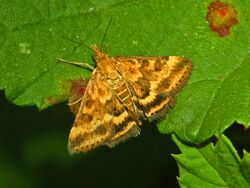Biology:Pyrausta despicata
| Pyrausta despicata | |
|---|---|

| |
| Scientific classification | |
| Domain: | Eukaryota |
| Kingdom: | Animalia |
| Phylum: | Arthropoda |
| Class: | Insecta |
| Order: | Lepidoptera |
| Family: | Crambidae |
| Genus: | Pyrausta |
| Species: | P. despicata
|
| Binomial name | |
| Pyrausta despicata (Scopoli, 1763)
| |
| Synonyms | |
| |
Pyrausta despicata, the straw-barred pearl, is a species of moth of the family Crambidae. It was described by Giovanni Antonio Scopoli in his 1763 Entomologia Carniolica.
Description
The wingspan of Pyrausta despicata can reach 14–19 mm.[1][2] The wings are brown or greyish, with quite variable pale brown markings. The forewings are brownish grey or brown, sometimes blackish-sprinkled; first line obscurely pale or obsolete; second in pale greyish-ochreous, often obsolete except on costa, in male whitish-ochreous, dilated on costa; small orbicular and oval discal spot rather darker, in female sometimes separated by a pale spot; sometimes a pale subterminal streak. Hindwings in male grey in female blackish; sometimes a darker discal dot; a curved postmedian fascia and subterminal streak in male obscurely ochreous-whitish, in female whitish-ochreous. The larva is dull brownish-black; dorsal line double, grey; spiracular dull ochreous; spots black, grey circled; head and plate of 2 brown, darker-freckled [3]
The moth flies from May to September depending on the location, in two generations.[1] It is active in the sunshine and at dusk.[4] The larvae feed on Plantago lanceolata and Plantago major.[1]
Distribution
Pyrausta despicata is present in most of Europe.[5]
Habitat
This moth prefers chalky and limestone habitats.[1]
References
- ↑ 1.0 1.1 1.2 1.3 UKMoths
- ↑ Norfolk Moths
- ↑ Meyrick, E., 1895 A Handbook of British Lepidoptera MacMillan, London pdf
 This article incorporates text from this source, which is in the public domain. Keys and description
This article incorporates text from this source, which is in the public domain. Keys and description
- ↑ Lepidoptera of Belgium
- ↑ Fauna Europaea
External links
Wikidata ☰ Q1523517 entry
 |


